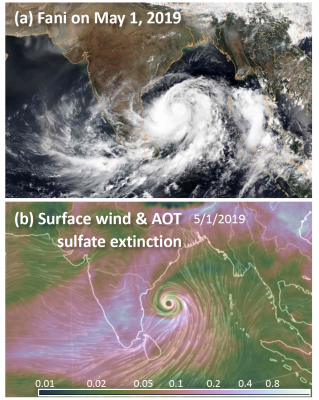Does Aerosol Fuel or Extinguish a Super Cyclone?
Cyclone Fani was an intense storm and it caused a high casualty. Analyzing the opposite effects of heat and aerosol on Fani shows that climate warming has overcome the negative effect of aerosol on intensifying tropical cyclones.
Fani developed within a high concentration of aerosols over the abnormally warm ocean, thereby presenting an opportunity to understand the compound effects of aerosols and regional warming on a tropical cyclone. The result lends support to the 2020 Super Cyclone Amphan, the strongest cyclone in the Bay of Bengal.
- A quantitative attribution analysis was conducted using the WRF-Chem at the convection-permitting grid spacing;
- Removal of tropospheric warming shows approximately twice as strong an effect on Fani as that of SST warming;
- Aerosol and its interaction with the atmosphere acted to mitigate the strengthening effect of anthropogenic warming on Fani, but was not strong enough to entirely counteract it;
- Reported in the news (WSJ, CBS, The Tribune, The Independent)

